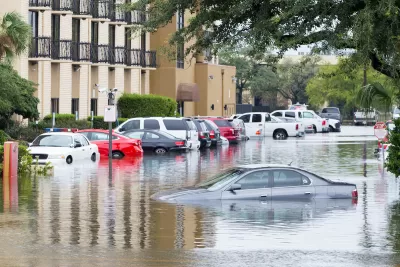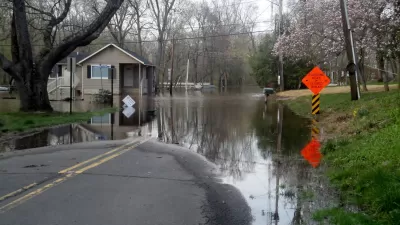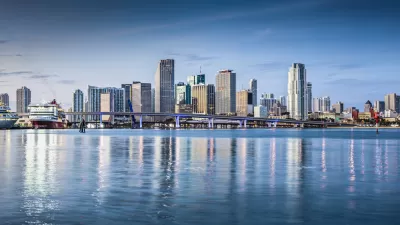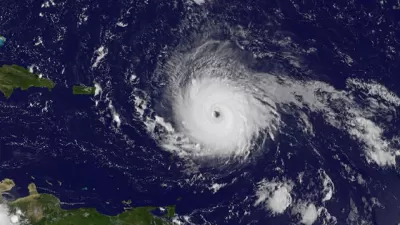A new study from CNBC ranks US states in order of sustainability and preparedness for climate change and extreme weather. A few might surprise you.

As part of its 2024 America’s Top States for Business study, media outlet CNBC has identified the 20 U.S. states most and least prepared for climate change and the extreme weather it brings. Published across two articles (one for the best prepared and one for the least prepared states), reporter Scott Cohn makes the case for why it’s an important topic.
From the increasing number of national disasters (“the National Oceanic and Atmospheric Administration estimates weather and climate disasters in the U.S. did nearly $93 billion in damage last year”) to the fact that we’re all already paying for it (homeowners insurance is “up 27% nationwide since 2021, according to data compiled by online insurance marketplace Insurify,” and not just in states like Louisiana, which are seeing double-digit raises annually), sustainability is no longer a issue for the future. That future is here. Despite this fact, Cohn writes, some of the states that are more vulnerable than others “are not doing all they can to mitigate the risks.”
According to the article, the study weighted infrastructure the heaviest, and sustainability was a major factor in that category’s score. The study incorporated state-level figures from First Street, a flood risk research foundation, “for properties at risk of major damage from flooding, extreme heat, wildfires and wind in the next 30 years” and NOAA data “on extreme weather for the primary geographic regions in which state are situated,” as well as U.S. Department of Energy data on renewable power.
Some of the results, especially on the best-prepared list are surprising, Arizona in particular. The study appears to have weighted flood risk very heavily and, in the article’s analysis at least, glosses over the seriousness of extreme heat. The article reads: “The Grand Canyon State’s intense desert climate can be harsh in its own way, with 645 heat-related deaths last year alone in Maricopa County, home to Phoenix. But at the same time, only about 5% of properties are at risk of flooding.”
So while this study is an interesting lens through which to look at various states’ preparedness for climate change and extreme weather events (of which CNBC doesn’t seem to consider extreme heat one, despite recent calls from state attorney generals for FEMA to classify it as a major disaster), it’s important to keep in mind it was conducted through the lens of sustainability for businesses deciding where to locate their companies, not for the health of communities and the people who live in them.
The lists below are also interesting when considered in context with the analysis of the top 20 cities most and least threatened by climate change published by online insurance marketplace PolicyGenius earlier this year.
10 States Least Prepared for Climate Change and Extreme Weather
1. (tie) Louisiana
1. (tie) New Jersey
3. Connecticut
4. Mississippi
5. Ohio
6. Pennsylvania
7. New Hampshire
9. (tie) Texas
9. (tie) Delaware
10. Maryland
10 States Best Prepared for Climate Change and Extreme Weather
1. Nevada
2. Idaho
3. South Dakota
4. California
5. Colorado
6. Nebraska
7. New Mexico
8. Washington
9. Arizona
10. Oregon
FULL STORY: These 10 U.S. states are America’s least-prepared for climate change and extreme weather

Planetizen Federal Action Tracker
A weekly monitor of how Trump’s orders and actions are impacting planners and planning in America.

Congressman Proposes Bill to Rename DC Metro “Trump Train”
The Make Autorail Great Again Act would withhold federal funding to the system until the Washington Metropolitan Area Transit Authority (WMATA), rebrands as the Washington Metropolitan Authority for Greater Access (WMAGA).

The Simple Legislative Tool Transforming Vacant Downtowns
In California, Michigan and Georgia, an easy win is bringing dollars — and delight — back to city centers.

Albuquerque’s Microtransit: A Planner’s Answer to Food Access Gaps
New microtransit vans in Albuquerque aim to close food access gaps by linking low-income areas to grocery stores, cutting travel times by 30 percent and offering planners a scalable model for equity-focused transit.

This City Will Pay You to Meet Your Neighbors
A North Kansas City grant program offers up to $400 for residents to throw neighborhood block parties.

Commentary: Our Silence Will Not Protect Us
Keeping our heads down and our language inoffensive is not the right response to the times we’re in. Solidarity and courage is.
Urban Design for Planners 1: Software Tools
This six-course series explores essential urban design concepts using open source software and equips planners with the tools they need to participate fully in the urban design process.
Planning for Universal Design
Learn the tools for implementing Universal Design in planning regulations.
Smith Gee Studio
City of Charlotte
City of Camden Redevelopment Agency
City of Astoria
Transportation Research & Education Center (TREC) at Portland State University
US High Speed Rail Association
City of Camden Redevelopment Agency
Municipality of Princeton (NJ)





























